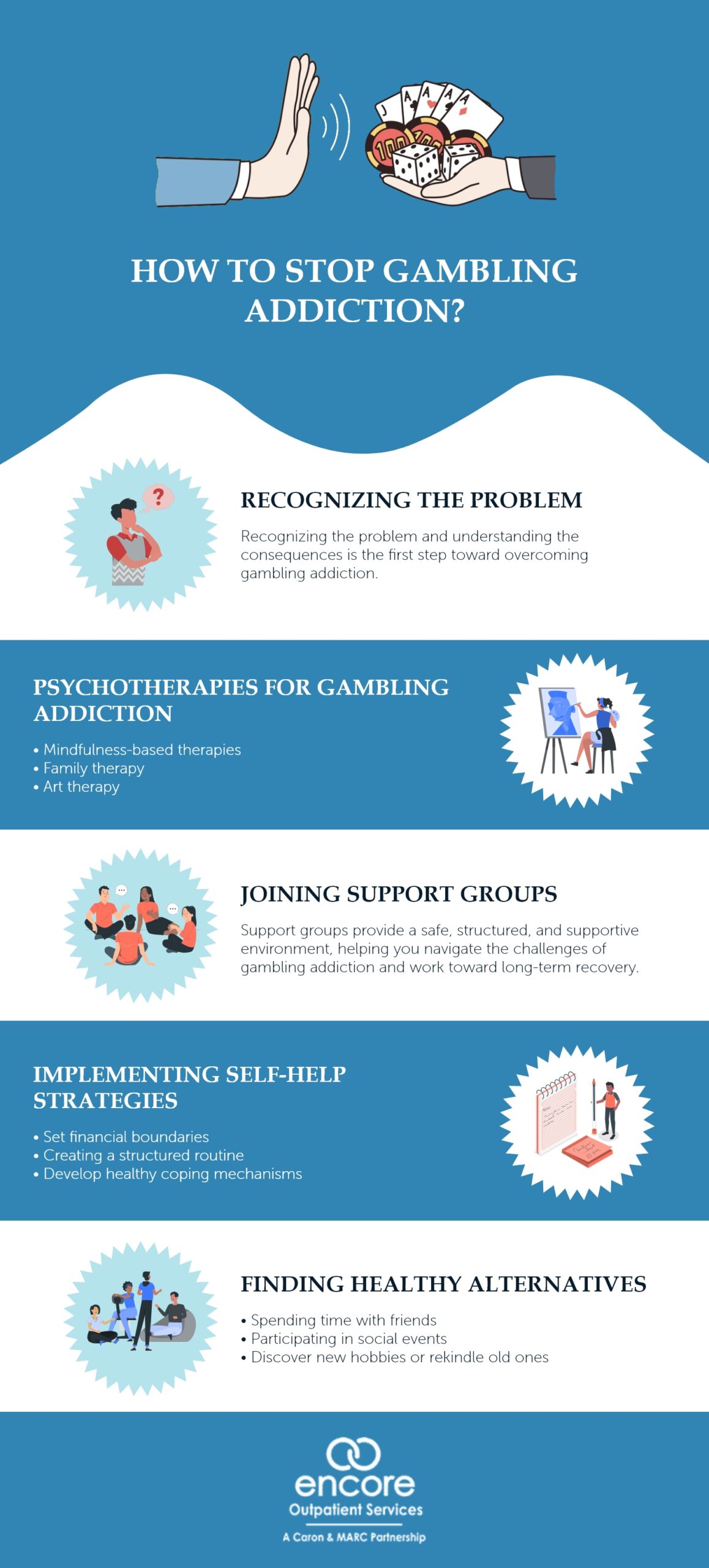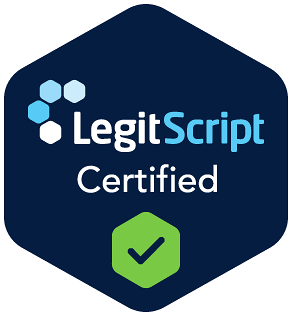Our dedication lies not just in treating symptoms but in addressing the root causes, offering a holistic approach that integrates the best of therapeutic practices with the warmth of community support.
How to Stop Gambling Addiction?

Gambling addiction is a serious issue that can cause significant negative consequences on your personal, financial, and professional life. Recognizing the problem and taking steps to address it is crucial for recovery. This blog post provides practical strategies and resources to help you regain control over your life.
Recognizing the Problem
Recognizing the problem is the first step toward overcoming gambling addiction. Here are some signs to look out for:
- Preoccupation with Gambling: Constantly thinking about gambling, planning the next session, or reliving past experiences.
- Increased Tolerance: Needing to gamble with larger amounts of money to achieve the same level of excitement.
- Chasing Losses: Continuously gambling to recoup losses, often leading to even greater financial troubles.
- Inability to Stop: Making repeated unsuccessful attempts to cut back or stop gambling.
- Neglecting Responsibilities: Ignoring work, school, or family obligations due to gambling habits.
- Financial Issues: Experiencing significant financial problems, such as accumulating debt or borrowing money to gamble.
- Emotional Distress: Feeling anxious, stressed, or depressed as a result of gambling activities.
Acknowledging these signs and understanding the consequences of gambling is essential for taking the necessary steps toward recovery.
Is There a Cure for Gambling Addiction?
There is no definitive cure for gambling addiction, but it can be effectively managed with the right treatment and support. The goal is to manage symptoms, improve functioning, and enhance quality of life. Recovery is an ongoing process that requires a multifaceted strategy that incorporates evidence-based psychotherapies, support groups, and self-help strategies.
While there is no cure, with the right treatment and support, you can manage your gambling addiction and lead fulfilling, healthy lives.

Seeking Professional Help
Getting professional help to address gambling disorder is crucial for several reasons:
- Expert Guidance: Mental health professionals have the expertise to diagnose and treat gambling addiction effectively, providing tailored treatment plans based on individual needs.
- Structured Support: Therapy offers structured support, helping you develop coping strategies, set goals, and stay accountable throughout your recovery process.
- Addressing Underlying Issues: Gambling addiction often coexists with other mental health conditions, such as anxiety, depression, or substance use disorders. Professionals can identify and treat these conditions for comprehensive treatment.
- Preventing Relapse: Professional treatment includes strategies to prevent relapse, helping individuals recognize gambling triggers and develop healthy ways to manage stress and urges.
- Long-Term Recovery: Professional help ensures ongoing support and follow-up, essential for maintaining long-term recovery and preventing relapse.
Professional help provides the necessary tools, support, and expertise to address gambling addiction effectively and ensure sustainable recovery.
Psychotherapies for Gambling Addiction
Several psychotherapies are effective in treating gambling addiction. Key approaches include:
- Cognitive-Behavioral Therapy (CBT): CBT helps you identify and change unhealthy thought patterns and behaviors related to gambling. It focuses on developing coping strategies and problem-solving skills to manage urges.
- Motivational Interviewing (MI): MI enhances your motivation to change by exploring and resolving ambivalence. It helps you find your own reasons for making positive changes and committing to treatment.
- Family Therapy: Family therapy involves your family or partner in the treatment process. It aims to improve communication, address family dynamics, and strengthen the support system.
- Mindfulness-Based Therapies: These therapies help you develop awareness of your thoughts and emotions. They promote stress reduction and improve emotional regulation, reducing the likelihood of relapse.
- Art Therapy: Art therapy provides a non-verbal, creative outlet for you to express emotions, feelings, and experiences related to your problematic gambling. It complements other evidence-based treatments.
- Nature-Based Therapy: Exposure to nature-based stimuli can induce relaxation and other positive effects. It complements other evidence-based treatments.
These psychotherapies offer structured and effective approaches to address gambling addiction.
Joining Support Groups
Joining a support group is an important step in your recovery process.
- Shared Experiences: Support groups provide a platform for you to share your experiences, challenges, and successes with others who understand your situation.
- Mutual Support: Members offer each other encouragement and advice, creating a network of support that can be crucial for maintaining recovery.
- Accountability: Regular meetings help you stay accountable to your recovery goals and commitments, reducing the risk of relapse.
- Resources and Information: Support groups often provide valuable resources and information about coping strategies, treatment options, and other helpful information.
- Emotional Relief: Talking about struggles in a supportive environment can reduce feelings of isolation, shame, and stress, contributing to overall emotional well-being.
Some of the key support groups for gambling addiction include:
- Gamblers Anonymous (GA): GA holds regular meetings where members discuss their struggles and support each other in their recovery process.
- Gam-Anon: This support group is specifically for the family and friends of people with a gambling addiction.
- SMART Recovery: This support group focuses on self-empowerment and science-based strategies.
Support groups provide a safe, structured, and supportive environment, helping you navigate the challenges of gambling addiction and work toward long-term recovery.
They are often recommended as a complementary approach to professional treatment.
Implementing Self-Help Strategies
Self-help programs provide practical strategies and resources to help you develop coping skills and make healthier choices around gambling habits.
Key strategies include:
- Setting Financial Boundaries: Establish strict spending limits and manage finances carefully to prevent impulsive gambling. Consider handing over financial control to a trusted person.
- Developing Healthy Coping Mechanisms: Identify and practice alternative activities to manage stress and emotions, such as exercise, hobbies, or relaxation techniques.
- Creating a Structured Routine: Maintain a regular daily schedule to reduce idle time and minimize opportunities for gambling.
- Avoiding Triggers: Recognize and avoid situations, people, or places that may trigger the urge to gamble. Stay away from gambling venues and online gambling sites.
- Seeking Support: Reach out to friends and family for emotional support and encouragement. Joining support groups can provide additional motivation and accountability.
- Educating Yourself: Learn more about gambling addiction and its effects. Understanding the condition can help reinforce the importance of sticking to recovery goals.
- Self-Monitoring: Practices like keeping a gambling diary or tracking expenses can help you develop self-awareness and identify patterns in your gambling behavior.
Self-help strategies can help you manage your gambling urges and maintain long-term recovery.
Involving Family and Friends
There are several reasons why it’s important to involve your family and friends in your treatment process:
- Emotional Support: Family and friends provide crucial emotional support, offering encouragement and understanding during the recovery journey.
- Accountability: Loved ones can keep you accountable for your actions and reduce the likelihood of relapse.
- Improved Relationships: Addressing gambling addiction with their support can help repair and strengthen strained relationships, fostering a healthier home environment.
- Enhanced Motivation: Knowing that family and friends are invested in your recovery can motivate you to stay committed to treatment plans.
- Shared Responsibility: Family members can help manage finances, set boundaries, and create a structured routine to minimize gambling opportunities.
- Better Communication: Involving family and friends in therapy sessions can improve communication, help address underlying issues, and promote mutual understanding.
- Comprehensive Support Network: A strong support network can provide a safety net during challenging times, offering practical and emotional assistance as needed.
- Coordinating Care: Family members can provide important information about your gambling behaviors and triggers that the treatment team can use to develop a more effective treatment plan.
- Preventing Enabling Behaviors: Family members may inadvertently enable your gambling behaviors by bailing you out financially or by making excuses. Involving them in treatment can help identify and address these enabling behaviors.
The involvement of family and friends in the treatment process creates a supportive and collaborative environment, enhancing the chances of successful recovery from gambling addiction.
Finding Healthy Alternatives
Finding healthy alternatives to gambling is essential for maintaining recovery and enhancing overall well-being. Here are some fun activities to try out:
- Engaging in Hobbies: Discovering new hobbies or rekindling interest in old ones can provide a positive outlet for energy and creativity.
- Physical Activity: Regular exercise, such as walking, swimming, or joining a sports team, helps reduce stress and improve mood.
- Social Activities: Spending time with friends, participating in social events, or doing volunteer work can build connections and provide a sense of community.
- Creative Pursuits: Exploring creative activities like painting, writing, or playing an instrument can be fulfilling and therapeutic.
- Educational Opportunities: Pursuing educational courses or learning new skills can provide a productive and engaging focus.
- Relaxation Techniques: Practicing relaxation techniques such as meditation, yoga, or deep breathing can help manage stress and reduce the urge to gamble.
These healthy alternatives can provide satisfying and positive ways to spend time, reducing the likelihood of returning to compulsive gambling behaviors.
Outpatient Treatment for Gambling Addiction
Outpatient treatment offers several advantages:
- Flexibility and Convenience: Outpatient programs allow you to continue living at home and maintain your normal daily routine. They also provide more flexibility in scheduling therapy sessions and other treatment activities around work, family, or other commitments.
- Accessibility and Affordability: Outpatient programs are more accessible and affordable compared to residential or inpatient treatment.
- Personalized Treatment: Outpatient programs offer tailored treatment plans that address the specific needs and circumstances of each individual.
- Integration with Daily Life: Outpatient programs help you apply coping strategies and skills learned in therapy to real-life situations, promoting long-term recovery.
- Community Support: Outpatient programs enable you to build a support network within your community, fostering a sense of connection and accountability.
- Holistic Approach: Outpatient programs often incorporate comprehensive treatment approaches that effectively address the psychological, emotional, and social aspects of gambling addiction.
Outpatient treatment provides a practical and effective approach to managing gambling addiction, offering the support needed to achieve and maintain recovery while balancing everyday life.
If you or a loved one is in need of a treatment program for gambling disorder, Encore Outpatient Services is here for you.
We offer comprehensive treatment options for substance use disorders and mental health conditions, including partial hospitalization, intensive outpatient, and general outpatient programs. Contact Encore Outpatient Services today to learn more about how we can help you achieve long-term wellness.
Maintaining Long-Term Recovery
Maintaining long-term recovery from gambling addiction requires ongoing effort and support. Key strategies include:
- Continued Therapy: Regular therapy sessions help reinforce coping strategies and address any emerging issues.
- Support Groups: Ongoing participation in support groups provides continuous encouragement and accountability.
- Healthy Lifestyle: Adopt a healthy lifestyle, including regular exercise, balanced nutrition, and sufficient sleep, to support overall well-being.
- Avoiding Triggers: Identifying and avoiding gambling triggers can curb your urge to gamble.
- Stress Management: Develop effective stress management techniques, such as mindfulness, meditation, or hobbies, to cope with life’s challenges without resorting to gambling.
- Setting Goals: Establish and work towards personal goals to maintain focus and motivation.
- Strong Support Network: Maintain relationships with supportive family and friends who understand and encourage your journey.
These strategies help you stay committed to your recovery, reduce the risk of relapse, and lead a fulfilling, healthy life.
Let Us Support You On Your Recovery Journey!
Copyright 2025 Encore Outpatient Services | All Rights Reserved



